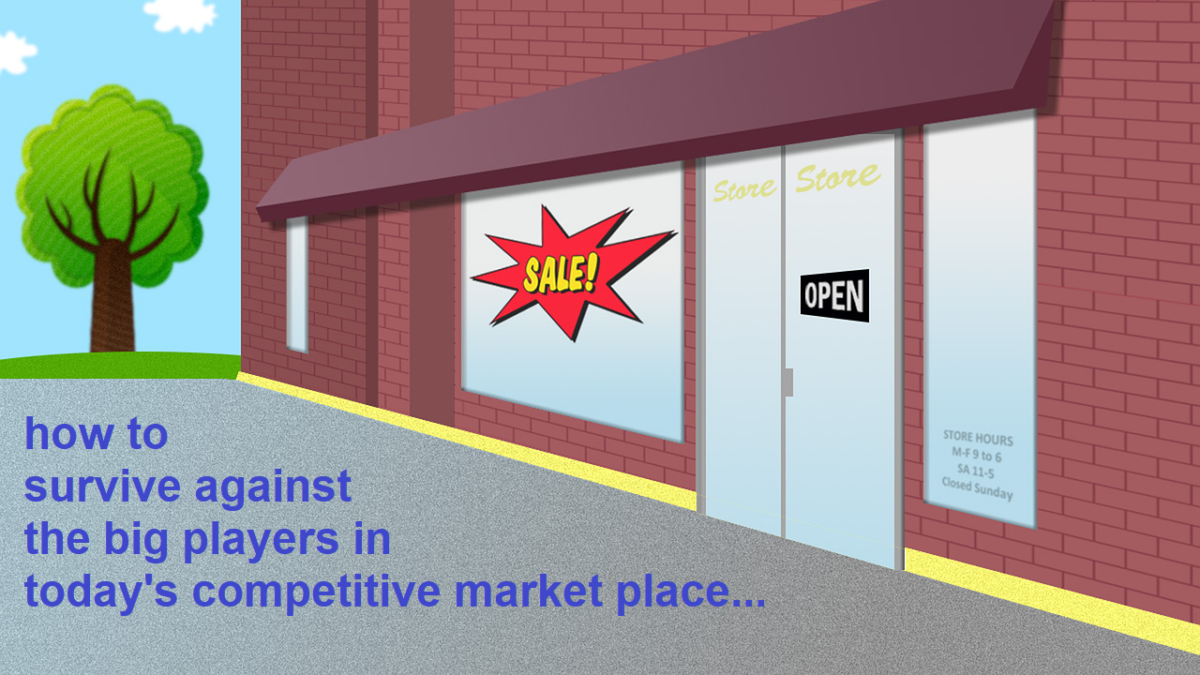If you’re running a high street retail business, and you’re losing out to Amazon, supermarkets and chain stores, there may be things you can do to help mitigate the problem.
Increasing your sales depends very much on what you sell. If your shop displays technology for example, Amazon and PC World are going to make your life very difficult.
Battling Against the Big Players
If you run an independent coffee house, delicatessen, greengrocers, butchers, bakery, or something similar, Amazon is not your enemy. However, you are still up against the power of supermarkets and coffee chains like Costa Coffee and Starbucks. They buy in bulk and offer discounts to tempt potential customers. Also, they are increasingly online and expanding their home deliveries.
You can beat supermarkets by simply offering a much wider range of products in your niche.
Is Cheese Your Weapon of Choice?
In the Monty Python cheese shop sketch, the list of cheeses seems endless. Significantly for the specialist trader, a supermarket is unable to compete with such a wide range of local and specialist cheeses, or any other product, as they are restricted by having to display an enormous range of different products.
So by enticing customers with your extensive stock of cheeses, or vegetables, or local meat, you can still generate customer loyalty and satisfaction in a way the supermarkets, as good as they are, can only dream about.
Is there anything else you can do to combat the power of the supermarkets?
Stay Ahead with User-Friendliness
My local greengrocers in Eastbourne (East Sussex UK) takes orders and delivers to my door. For the past two years, I have bought bulky items like Christmas trees and bags of garden compost. These have been promptly delivered to my door same day.
This greengrocer also offers a much wider range of fruit and vegetables than any local supermarket. Additionally, and very enjoyably, there’s also the pleasure of the personal touch. Owners and staff know me in their shop, and they also know where I live. I can go in and have a chat in a way that I can’t in the local Co-op or Sainsbury’s.
So carrying a wide range in your niche, offering a personal touch, and making home deliveries helps you to battle against the power of the supermarkets.
Niche Products And Exceptional Service
Outlets that stock computers, hi-fi, mobile phones, white goods, hardware products, sports clothing and similar items, have Amazon as their chief competitor.
As well as having a very slick user-friendly operation and (as a result) a bucket load of money, Amazon has one thing that High Street shops don’t have – and that’s a high level of visibility worldwide – making Amazon (and your next purchase) easily accessible with a few mouse clicks.
Local businesses can only compete by supplying products alongside additional services not available on Amazon. A useful sales advantage could also be gained by offering inclusive upgrades, servicing or repairs, that an online vendor would find difficult to organize.
Is Good Service Enough?
While customers may be prepared to pay a little extra to know products they buy from you have backup, your potential customers still have to leave home and flog down to the shops to buy locally.
Ideally, local shops would gang up and form a centralized order and distribution service. But those businesses operating in a bubble, are likely to resist joining other retailers, even though this could be their salvation. It would take strong leadership to make amalgamated orders and home deliveries from local vendors work efficiently.
However, no business wants to become obsolete through lack of vision, or failure to act.
Understanding Your Business Is Critical
The clink of bottles, and the unique sound of the milkman’s electric van, early each morning, disappeared from the UK streets, because operators didn’t understand the business they were in.
They didn’t realise they weren’t “Milkmen”… they were running a powerful home delivery service, that just happened to deliver milk.
As soon as milk was readily available in supermarkets and petrol stations, it was the beginning of the end for milkmen. Had the milkmen seen the opportunity under their noses, they would be running popular and flourishing businesses today.
Just think, thousands of electric delivery vans, dropping off local food and veg at the crack of dawn, delivering dry-cleaning and online orders – instead, they fizzled out like a damp squib.
As competition hots up, it’s no good opening your door and waiting for customers to walk in. The key to survival is understanding your business, personalising your business offering, and getting down to some serious marketing.
# # #
